Aaron Rodgers: Six Greatest Career Highlights
GREEN BAY, Wis. – For 15 seasons, Aaron Rodgers led the Green Bay Packers to one victory after another thanks to statistical domination rarely seen in NFL history. Now, with the team ready to start a future with Jordan Love, Rodgers is set to be traded to the New York Jets.
The four-time MVP, despite sitting on the bench for three seasons, ranks second in NFL history in passer rating, fifth in touchdown passes and ninth in passing yards.
Rodgers had two of the greatest seasons in the history of football. When he won his first MVP in 2011, his 122.5 passer rating – built on a staggering 45 touchdowns vs. six interceptions – set a still-standing NFL record. In 2020, Rodgers won his third MVP by joining Steve Young as the only quarterbacks since the 1940s to lead the NFL in completion percentage, touchdown percentage and interception percentage.
Rodgers replaced Brett Favre in 2008. It was an incredible amount of pressure considering Favre’s success and popularity. Rodgers led the Packers to a 6-10 record that first season, then drove the team into the playoffs each of the next eight seasons. With Matt LaFleur hired in 2019, the Packers became the first team in NFL history with three consecutive seasons of 13-plus wins.
Despite all the personal and team success, Rodgers led the Packers to only one Super Bowl win.
“I have a lot of pride in what I’ve accomplished in this league,” Rodgers said after the season-ending loss to Detroit. “In a lot of ways, I don’t feel like we should have been even in this position with some of the games we lost, especially in that stretch of five games, but this is the reality we’re in. Obviously, we didn’t get it done tonight.
“You want to go out winning the Super Bowl, but it’s very rare that ever actually gets to happen. You don’t want to lose your last game and miss out on the playoffs, but this has been a great position and a really tough business. It doesn’t always end with rainbows for everybody.”
Here are six of Rodgers’ greatest accomplishments.
Six: Playoffs at Dallas
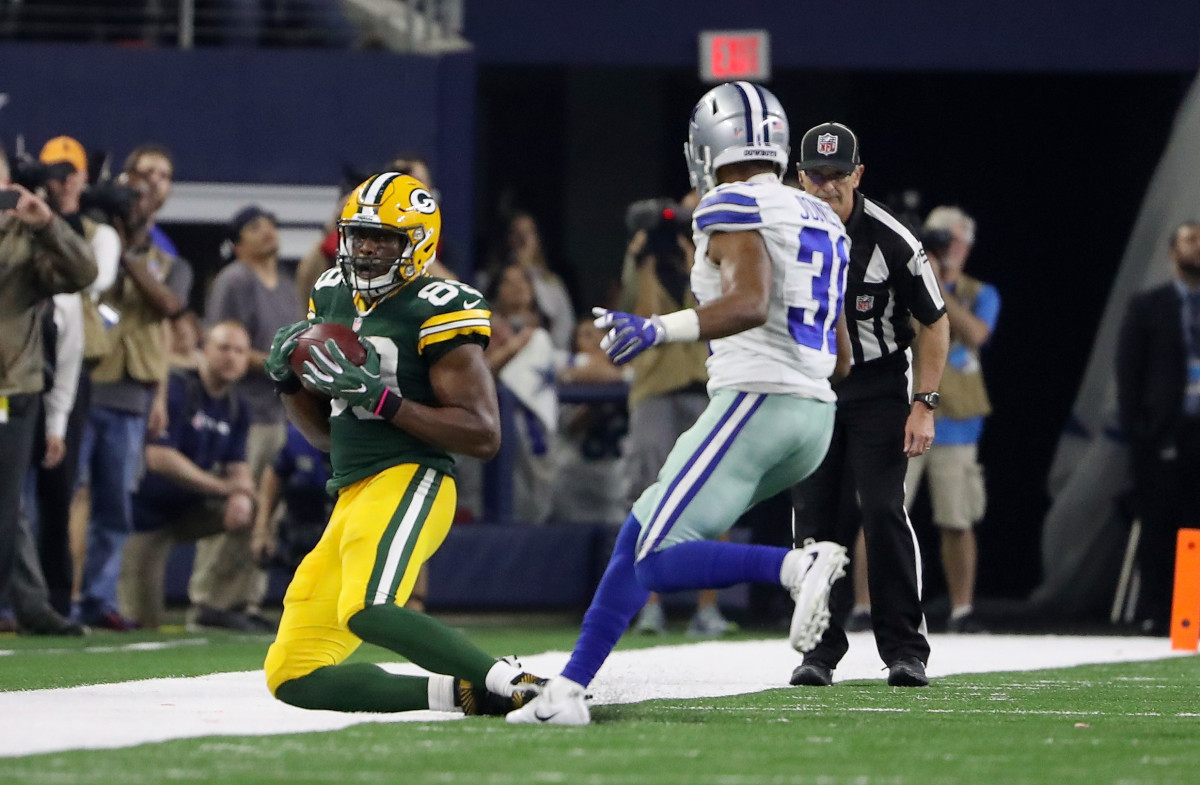
In the 2016 divisional playoffs at Dallas, back-to-back touchdown passes from Dak Prescott created a 28-28 tie with 4 minutes remaining.
Enter Rodgers. And Mason Crosby. Highlighted by a 16-yard completion to Davante Adams, the Packers drove to Crosby’s 56-yard, go-ahead field goal with 1:33 remaining.
Prescott answered to set up Dan Bailey’s 51-yard field goal to tie the game at 31 with 35 seconds to go.
Rodgers responded with perhaps the great pass in franchise history. On third-and-20, Rodgers escaped the pocket to his left, avoided a sack and threw an improbable pass to Jared Cook at the sideline, with the tight end getting both feet inbounds for a gain of 35 to the Cowboys’ 33 with 3 seconds to go. Crosby booted a 51-yard field goal to send Green Bay to the NFC Championship Game.
Five: Run the Table
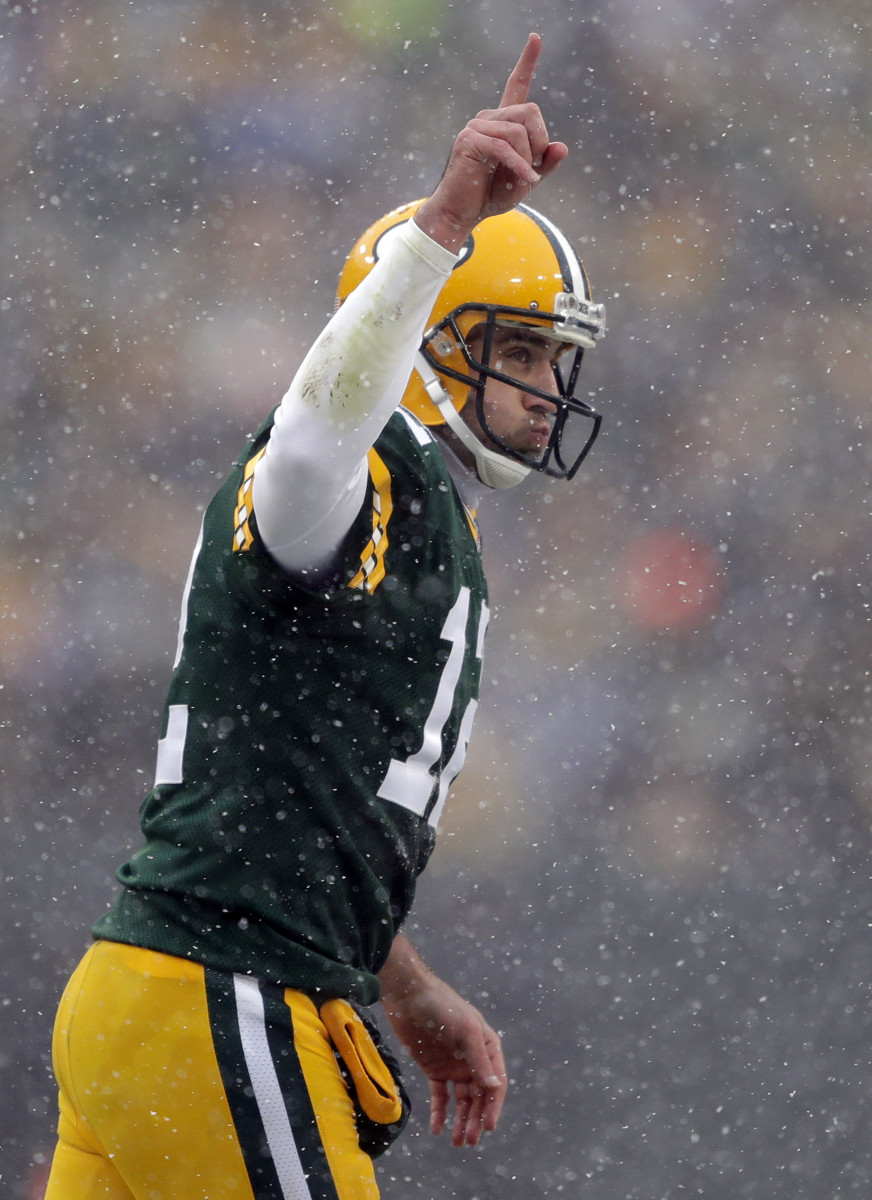
In 2016, the Packers were trounced 42-24 at Washington. It was their fourth consecutive loss and sent their record to 4-6.
“I feel like we can run the table, I really do,” Rodgers said at his locker the following Wednesday.
And they did. Rodgers talked the talk and did he ever walk the walk. During the final six games of the regular season, Rodgers completed 71.0 percent of his passes and threw 15 touchdowns vs. zero interceptions. That hot stretch continued into the playoffs, with Green Bay demolishing the Giants in the wild-card round and edging Dallas in the divisional round.
Finally, the Packers ran out of magic – and players – in the NFC Championship Game at Atlanta. With LaDarius Gunter forced to cover Julio Jones, fullback Aaron Ripkowski the last man standing in the backfield, Jordy Nelson playing with broken ribs, Davante Adams powering through an injured ankle and Letroy Guion finishing the game at guard, Green Bay was trounced.
Four: Touchdown/Interception Legend
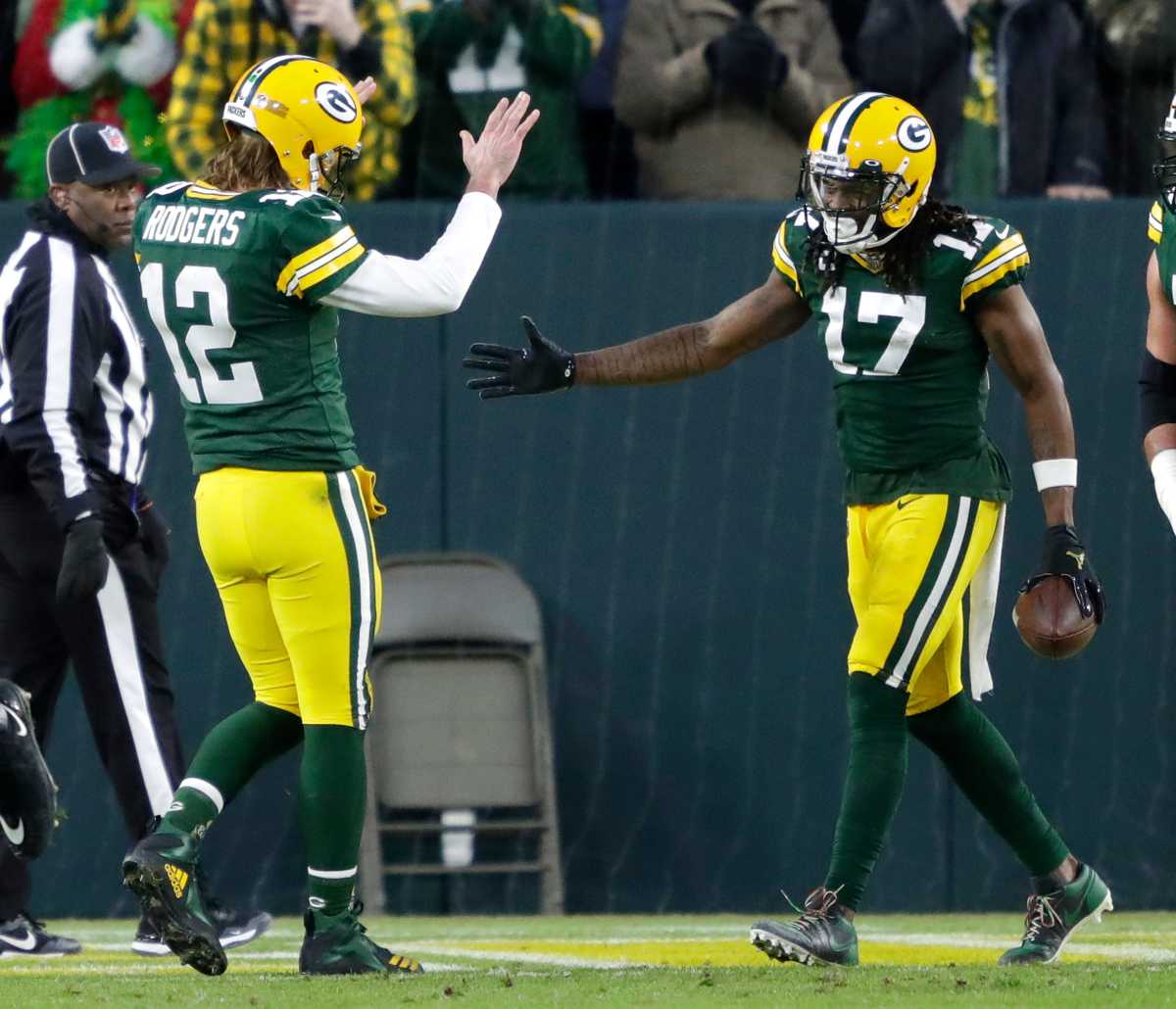
No quarterback has ever made so many big plays while avoiding so many bad plays. For his career, Rodgers has thrown 4.52 touchdowns for every interception. That’s the best in NFL history by a large margin.
Chiefs star Patrick Mahomes is a distant second with 3.92 touchdowns. If Rodgers threw 16 consecutive interceptions, he’d still be ahead of Mahomes. Or, Mahomes could throw 30 consecutive touchdowns and still trail Rodgers.
Russell Wilson (3.14 touchdowns per interception) and Tom Brady (3.06) are the only other passers at better than 2.75.
Three: Owner of Chicago
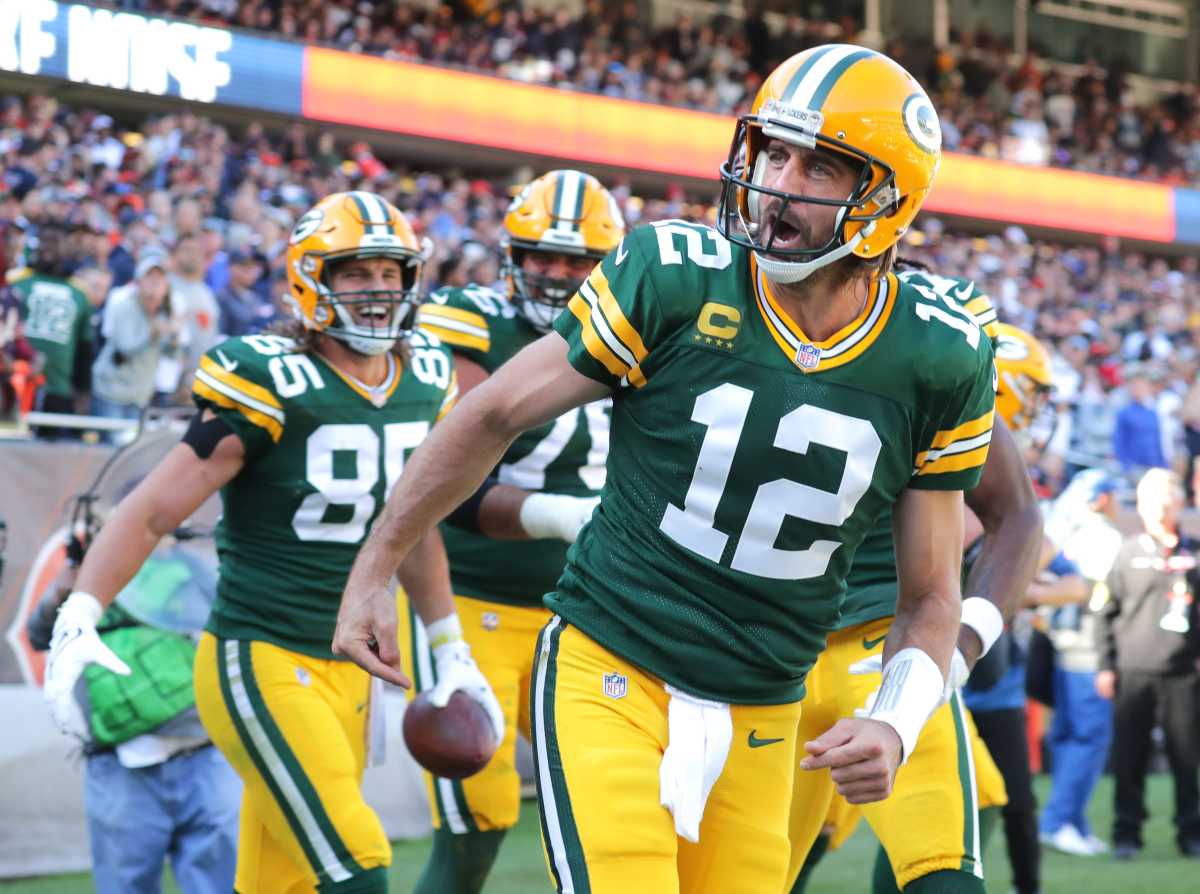
Before Brett Favre arrived on the scene in 1992, the Bears held a 24-game lead over the Packers in their ancient feud. Favre helped turned the tide, and Rodgers turned it into a tsunami.
“I’ve owned you all my (bleeping) life! I own you! I still own you!” Rodgers said after his key touchdown run to help clinch a victory at Chicago in 2021.
You’re damned right he did. Rodgers went 24-5 against Chicago. Take away the 2013 loss at Lambeau Field in which Rodgers suffered a broken collarbone on the opening series and add the 2010 NFC Championship Game, that record of domination turns to 25-4. In a league in which road wins are precious, he won 11 of his last 12 treks to Soldier Field.
Rodgers threw 64 touchdown passes against Chicago in 29 games. That would rank fourth on the Bears' all-time list.
“You definitely draw a lot of confidence and good memories off of this matchup,” Rodgers said. “We’ve had a tremendous amount of success during my time against them. I’ve enjoyed playing here, lot of great memories here over the years. It’s been a special rivalry that I’ve been able to be a part of.”
If “I own you” was a signature moment, the night of Nov. 9, 2014, at Lambeau Field was a signature game.
Rodgers completed 18-of-24 passes for 315 yards and six touchdowns. The six touchdowns all came in the first half. If not for Randall Cobb’s fumble at the Bears’ 4 early in the second quarter, Rodgers might have thrown seven touchdowns.
As it was, Rodgers tied the franchise’s single-game record for most touchdown passes and became the first quarterback since the Raiders’ Daryle Lamonica in 1969 to throw six touchdown passes in a single half.
Two: Four MVPs
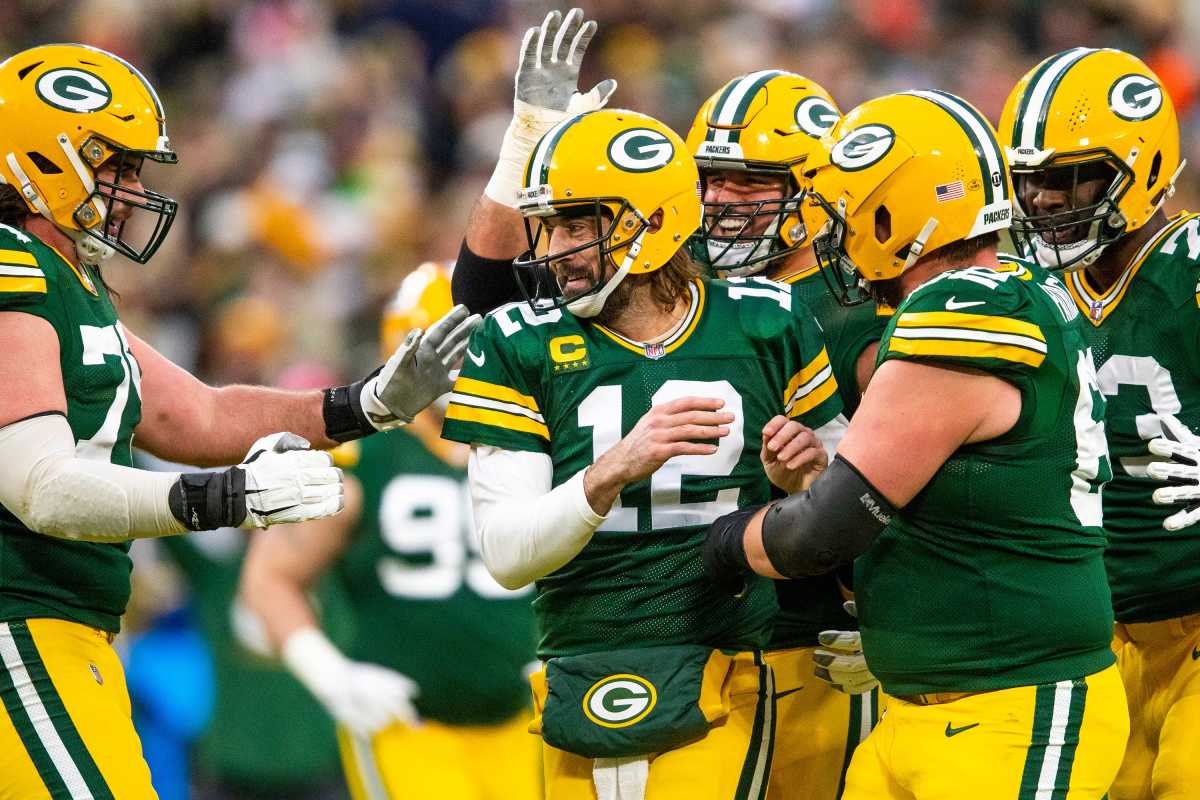
When Rodgers won MVP in 2020, he broke a tie with Favre, Jim Brown, Johnny Unitas and Tom Brady and moved within one of Peyton Manning’s NFL-record five.
To secure that fourth MVP, Rodgers was sensational with seven consecutive games of two-plus touchdowns and zero interceptions while dealing with a broken toe. He became the only quarterback in NFL history to twice lead the league in passer rating, touchdown percentage and interception percentage.
“I’ve told the guys this a few times when I’ve had the opportunity to speak to them pregame, one of the greatest satisfactions in life is being held to a standard by your teammates and living up to that standard,” he said. “And I know when I take the field, that there’s a standard those guys hold me to, and there’s an expectation of performance, and to be able to go out there and perform week after week, the way that I want to perform has been extremely meaningful to me.”
One: Replacing a Legend, Raising the Bar
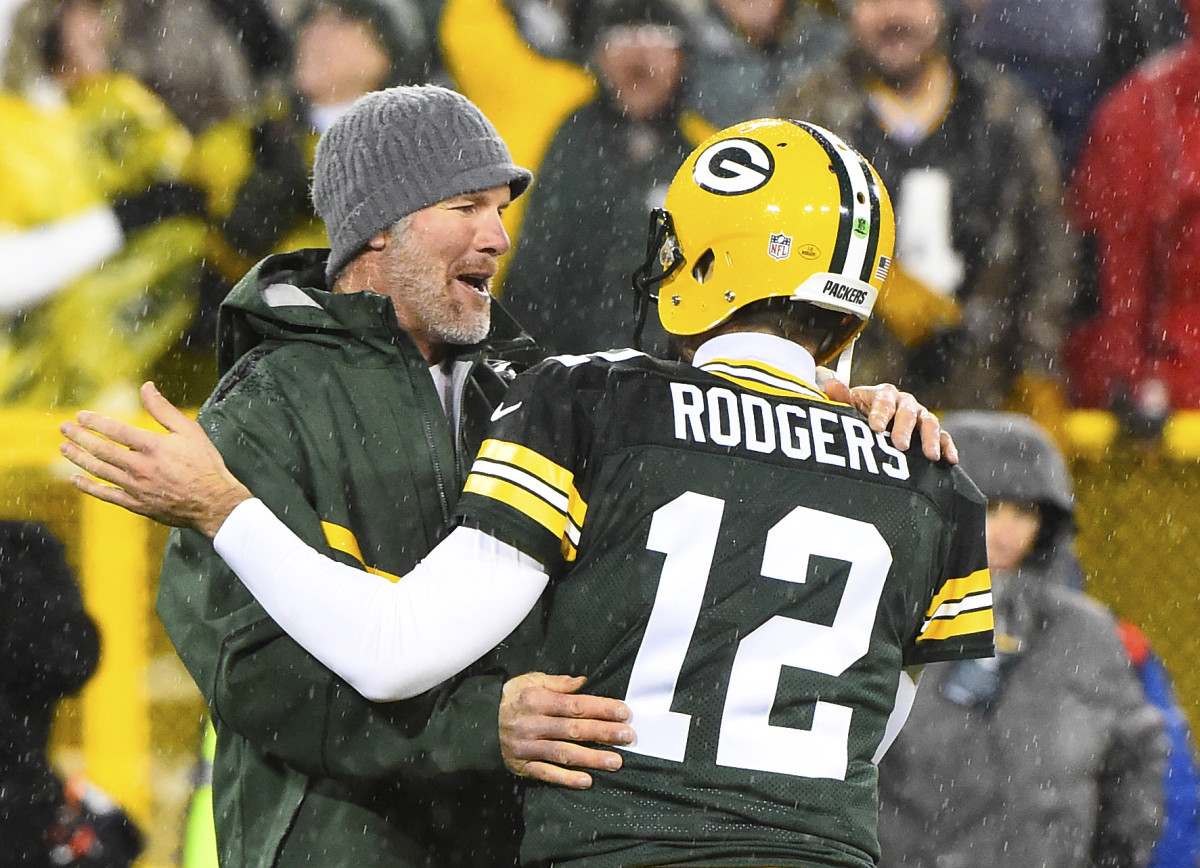
When Rodgers was drafted in the first round in 2005, he knew the challenge that was ahead in – eventually – replacing one of the icons of the game, Brett Favre.
“Pressure? Following Brett Favre?” Rodgers said to laughs. “Yeah, definitely (there will be) a lot of expectations – high expectations. They are used to winning out there. They are going to expect me to step in and not miss a beat.”
Favre retired in 2008. Then he wanted to come back. The franchise held its ground and traded Favre to the Jets. At training camp that summer, the split in the fans and the tension was palpable. Rodgers handled it with aplomb. When the railbirds lining the practice field along Oneida Street chanted “Bring back Brett,” Rodgers told reporters at his locker afterward, “Brett Swain was getting a lot of attention today.”
Somehow, Rodgers didn’t just replace Favre. He raised the bar. Favre won three MVPs; Rodgers won four. They both won only one Super Bowl but Rodgers had more sustained success. Rodgers needs 34 touchdown passes to pass Favre for fourth place on the all-time list. He’s thrown 231 fewer interceptions. Yes, 231.
Of course, the ultimate achievement came on the night of Feb. 6, 2011, in Arlington, Texas, when Rodgers led the Packers to a Super Bowl triumph over the Pittsburgh Steelers. Rodgers was magnificent in bringing the title back to Titletown. In four playoff games that year, three times he threw three touchdowns vs. zero interceptions with 110-plus passer ratings.
While Rodgers might have worn out his welcome among a significant number of fans, he was a true face of the franchise. From throwing touchdown passes to slipping a random Cub Scout a hundred-dollar bill at a popcorn sale, Rodgers was a champion on the field and off.
More Green Bay Packers News
Who won the Aaron Rodgers trade?
Two mock drafts following Aaron Rodgers trade
Packers trade Aaron Rodgers to Jets
Aaron Rodgers leaves behind a complicated legacy
Stats, scouting, stories on Top 24 receivers
The receivers who might not be on the board
Stats, scouting, stories on Top 16 running backs
The running backs who might not be on the board
Stats, scouting, stories on Top 8 quarterbacks (beyond first-rounders)
The quarterbacks who might not be on the board
Packer Central’s all-predraft visits mock draft
